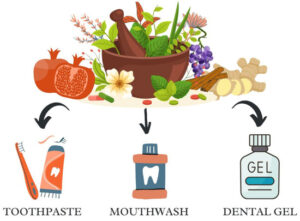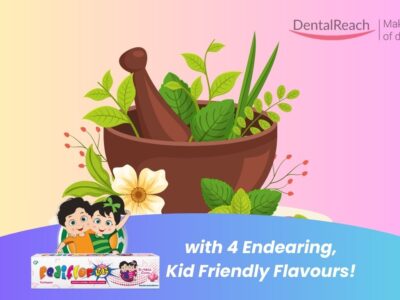Abstract
Herbal treatments have been utilized to treat oral diseases and preserve dental hygiene in a variety of cultures since ancient times. Researchers have examined the pharmacological and phytochemical characteristics of substances produced from plants, and assessed how their extracts interact with inflammatory processes and oral infections. In recent years there has been growing interest in herbal dentistry which explores the use of medicinal plants and natural extracts as therapeutic alternatives for the management of oral diseases. This article explores two such traditional medicinal plants popularly used by patients, namely tulsi and clove, and its role in naturally reducing dental pain.
Introduction
Dental pain is the most common oral problem, often resulting from dental caries, periodontal diseases, gingival inflammation, periodical infections or post extraction trauma. Relying on herbal and natural ingredients to relieve dental pain has been a part of many cultures world wide. Studies on herbal treatments with exceptional antibacterial, anti-inflammatory, antioxidant, anticancer, anticaries, analgesic, and therapeutic qualities are included in literature since time immemorial. This includes scientific research on herbal treatments for a range of dental and oral health issues like gingivitis, oral ulcers, mucositis, periodontitis, oral infections, xerostomia, cancer, and dental caries to name a few.
Two of the most common herbal ayurvedic medicinal plants – Tulsi and Clove have proven to reduce dental pain due to their anti-microbial, analgesic and anti-inflammatory properties. These herbs possess a wide variety of active components like alkaloids, flavonoids, tannins and essential oils. Both herbs provide a safe and environmentally friendly substitute for synthetic medications with negative side effects as they are readily available, reasonably priced, and biocompatible.
Tulsi – The Queen of Herbs
Tulsi (Ocimum sanctum) a member of the Labiatae family, also known as holy basil, is a medicinal plant widely used in ayurveda. The leaves, blossoms, stem, root seeds, and other elements of tulsi have therapeutic qualities. The leaves contain majority of the medicinal qualities. Approximately 71% eugenol and 20% methyl eugenol make up the 0.7% volatile oil found in tulsi leaves, which act as local anesthetic and analgesic. The active constituents of tulsi include – eugenol, ursolic acid and rosmarinic acid.
- Common mouth infections can be effectively treated with chewing tulsi leaves.
- Eugenol and linalool, which are found in tulsi oil, have antifungal properties that can help treat oral candidiasis
- Aids in the reduction of halitosis.
Mechanism Of Action
- Analgesic Effect – Eugenol inhibits prostaglandin synthesis, reduces pain and inflammation.
- Anti Inflammatory Effect – Decreases release of inflammatory mediators- eg- TNF – alpha, IL-6)
- Anti Microbial Properties – Active against streptococcus mutans, candida albicans and porphyromonas gingivalis.
- Antioxidant Effect- Neutralizes free radicals in inflamed or ulcerated tissues
Formulations In Use
- Raw tulsi leaves – consumed to heal oral infections and ulcers.
- Tulsi Oil– Applied with cotton swab on concerned area.
- Tulsi mouthwash – prepared from aqueous or ethanolic extracts – 0.5-2%
- Tulsi paste or gel – herbal formulations for topical use
- Tulsi tea or decoction – systemic anti-inflammatory support .
Clove – The Soothing Spice
Traditionally, clove (Syzygium aromaticum) has been used to alleviate mouth ulcers as well as tooth pain. Eugenol, the primary volatile oil found in cloves, is present in cloves. 72–90% of essential oils include it. The other components are methyl salicylate, crategolic acid, galatonic acid, vanillin, and beta cryophyllene.
Cloves are used in dentistry to treat toothaches along with dental pain. A 2021 review of previous studies also notes that cloves exhibit antibacterial activity against several types of bacteria that can cause gum and tooth disease, such as Streptococcus mutans, Staphylococcus aureus, Candida albicans.
Mechanism Of Action
- Eugenol cures toothaches because of its anesthetic properties.
- It has definite anti-inflammatory, anti-fungal, and anti-bacterial qualities because of its flavonoid content, which gives it an anti-inflammatory effect.
- It reduces halitosis as it has an antimicrobial action against Pneumomocci, Streptococci, and Staphylococci.
- It has an antiplaque impact and can cure periodontal and gingival diseases brought on by plaque.
Formulations In Use
- Plain Clove – if kept in mouth and chewed strengthens the gums
- Clove oil – available commercially to alleviate dental pain
- Clove mouthwash – has been shown in studies to have anti-gingivitis properties and its antifungal properties are used to treat oral candidiasis.
- Clove paste or gel – uses clove oil as a common ingredient for dental pain relief in herbal toothpastes
Advantages of Using Tulsi & Clove in Dental Pain Management
- Natural and biocompatible.
- Few side effects when used topically.
- Acts as both analgesic and antimicrobial.
- Cost-effective and easily available.
Limitations / Precautions in Using Tulsi & Clove in Dental Pain Management
- Direct concentrated oil may cause mucosal irritation.
- Should not replace standard dental therapy for pulpal or periodontal infections.
- Allergic reactions are rare but possible.
- Scientific evidence is limited to in vitro and small-scale studies.
- Difficulty in standardization of dosage & formulation
What is the Best Way to Incorporate Tulsi & Clove in Dental Pain Management?

Prescribing gel formulations which contain these two ingredients, either individually or in combination, is the best way to incorporate tulsi and clove in dental pain management. These formulations may be more affordable, more readily available, and thought to be safer than their synthetic counterparts.
Herbal gel formulations offer the following advantages –
- Targeted Relief: By delivering active ingredients straight to the mouth cavity’s afflicted areas, dental gels offer focused relief for conditions like pain, inflammation, and sensitivity.
- Convenience: Dental gels are easy to use and require little effort to administer. Because they come in convenient packaging like tubes or syringes, they are portable and perfect for use while traveling.
- Versatility: Dental gels can be made with various active ingredients to treat a variety of dental conditions. Formulations are offered to meet various oral health needs, including gum care, pain relief, desensitization, and antibacterial activity.
- Quick Action: When applied, a lot of dental gels give patients quick relief from issues like gum irritation or toothache while also making them more comfortable.
- Diminished Systemic Side Effects- Since dental gels mostly function locally in the oral cavity, they are less likely to cause adverse responses in other body parts than systemic medications like oral analgesics.
- Increased Patient Compliance: Dental gels’ targeted action and ease of use often result in higher patient compliance with treatment regimens since patients are more inclined to follow instructions when a product is practical and effective.
- Enhanced Comfort-Dental gels may contain relaxing ingredients that provide even more comfort to individuals experiencing oral discomfort, promoting a sense of well-being and alleviation.
- Adjunct to Professional Treatment-Dental gels serve as a symptomatic relief while patients wait for or undergo more involved procedures, which can enhance overall treatment results and patient satisfaction.
However, throughout the development and evaluation of these gels, factors such formulation stability, efficacy, safety, and patient acceptance need to be carefully taken into account.
Conclusion
The antibacterial properties of tulsi and clove aid in lowering oral microorganisms that cause dental infections, averting subsequent issues like abscesses and gingival irritation. Due to its anti-inflammatory and antioxidant properties, Tulsi helps to preserve the health of the oral mucosa and accelerates the healing of oral tissues. Clove oil is a useful supplement in emergency dental therapy because it quickly relieves pain in pulpitis, caries, and post-extraction discomfort. Their practical application in routine dental practice is improved by their incorporation into mouthwashes, gels, and herbal pastes.
However, to guarantee reliable and efficient results in dental pain management, standardization of dosage, formulation, and clinical procedures is required. To confirm their effectiveness and safety through evidence-based research, more scientific and clinical investigations are needed. All things considered, Tulsi and Clove show promise as supplements to traditional dental treatments, bolstering the idea of integrative and herbal dentistry for long-term, secure oral health care.
Disclaimer – Tulsi and clove’ s analgesic, anti-inflammatory, and antibacterial qualities make it a viable treatment for mouth pain. However, it should not be used in place of expert dental care, but rather as an addition to it. To standardize formulations and dosages, more clinical trials are required.
References
Image credits – Giuseppina Malcangi et al.Effectiveness of Herbal Medicines with Anti-Inflammatory, Antimicrobial, and Antioxidant Properties in Improving Oral Health and Treating Gingivitis and Periodontitis: A Systematic Review, Multidisciplinary Digital Publishing Institute (MPDI), 2025.
- Prakash P, Gupta N. Therapeutic Uses Of Ocimum Sanctum Linn (Tulsi) With A Note On Eugenol And Its Pharmacological Actions: A Short Review. Indian J Physiol Pharmacol. 2005;49(2):125–31.
- Rahman M, Ahmad S. Therapeutic Potential Of Ocimum Sanctum Linn. And Its Eugenol-Rich Oil In Oral Diseases. J Ayurveda Integr Med. 2019;10(1):35–44.
- Agarwal P, Nagesh L, Murlikrishnan. Evaluation Of The Antimicrobial Activity Of Various Concentrations Of Tulsi (Ocimum Sanctum) Extract Against Streptococcus Mutans: An In Vitro Study. Indian J Dent Res. 2010;21(3):357–9.
- Nagappan N. Antimicrobial Potential Of Ocimum Sanctum. Pharmacogn Rev. 2012;6(12)
- Formulation And Evaluation Of Dental Pain Relief Gel Using Clove Oil Author’s : 1) Mr. Vivek B. Mohale, Student, Vardhaman C- 2024 Ijcrt | Volume 12, Issue 6 June 2024 | Issn: 2320-2882.
- The Role Of Clove In Alleviating Toothache Anshita-1, Dr. Navjot Singh Sethi1 And Dr. Jyoti Gupta1 1 Iec University, Kalujhanda 174103, Dist. Solan, H.P. European Journal Of Pharmaceutical And Medical Research -Vol 12, Issue 5, 2025.





















Comments